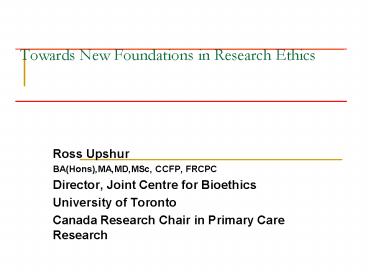Towards New Foundations in Research Ethics - PowerPoint PPT Presentation
1 / 47
Title:
Towards New Foundations in Research Ethics
Description:
World War 2 Medical War Crimes. The Tuskegee Syphilis Study. The Jewish Chronic Disease Hospital Study. The Willowbrook Study ... Researchers cannot be unaccountable ... – PowerPoint PPT presentation
Number of Views:61
Avg rating:3.0/5.0
Title: Towards New Foundations in Research Ethics
1
Towards New Foundations in Research Ethics
- Ross Upshur
- BA(Hons),MA,MD,MSc, CCFP, FRCPC
- Director, Joint Centre for Bioethics
- University of Toronto
- Canada Research Chair in Primary Care Research
2
Outline
- Historical Background
- Problems of Calibration
- Problems of Trust
- Problems of Integrity
- Emerging Issues
- Moving Forward
3
Historical context
- World War 2 Medical War Crimes
- The Tuskegee Syphilis Study
- The Jewish Chronic Disease Hospital Study
- The Willowbrook Study
- The San Antonio Contraceptive Study
- For More see http//www.ahrp.org/history/chronolo
gy.php
4
Evolution of Codes
- Nuremberg Code
- Declaration of Helsinki
- CIOMS
- Belmont Report
- National Guidelines
5
Fundamental principles
- The moral imperative of respect for human dignity
translates into other correlative ethical
principles - Respect for free and informed consent
- Respect for vulnerable persons
- Respect for privacy and confidentiality
- Respect for justice and inclusiveness
- Balancing harms and benefits
6
Emanuels 7 Requirements
7
Ethics review
Research requiring review REBs are responsible
for ethics review of research involving humans as
subjects of research Research Ethics Boards
(REBs) The REB has the authority to approve,
disapprove, propose modifications to, or
terminate any proposed or ongoing research
involving human subjects Review process REBs
adopt a proportionate approach to ethics review,
based on the principle that the more potentially
invasive or harmful the research, the more care
should be taken in its review. FOCUS IS ON
HUMAN SUBJECT PROTECTION
8
Canadian guidelines
Tri-Council Policy Statement
Living document, reflecting evolving field of
scholarship
- HOWEVER
- It mandates minimum and universal standards
9
Ethics Review
- Problems of Calibration
10
(No Transcript)
11
(No Transcript)
12
(No Transcript)
13
(No Transcript)
14
Problems of Trust
- External Influences on Science
15
(No Transcript)
16
(No Transcript)
17
(No Transcript)
18
(No Transcript)
19
(No Transcript)
20
(No Transcript)
21
(No Transcript)
22
Problems of Integrity
23
(No Transcript)
24
(No Transcript)
25
(No Transcript)
26
(No Transcript)
27
(No Transcript)
28
(No Transcript)
29
Scientists behaving badlyBrian C. Martinson,
Melissa S. Anderson and Raymond de VriesNature
435, 737-738 (9 June 2005)
30
(No Transcript)
31
Emerging Issues
- 1.) Embracing Determinants of Health
- 2.) Globalization of Research
- 3.) Ethics of Information Databases and
Genomics
32
(No Transcript)
33
Overarching Recommendations
- Improve living conditions
- Tackle the inequitable distribution of power
money and resources - Measure and understand the problem and assess the
impact of action
34
Margaret Chan WHO Director General
- The values and principles embodied in primary
health, the United Nations Millennium
Declaration, and initiatives such as PLoS
Neglected Tropical Diseases are all about
fairness, solidarity, collective responsibility,
participatory approaches, and a duty to take care
of vulnerable groups. Equity is a fundamental
principle of health development. Access to
life-saving and health-promoting interventions
should not be denied for unjust reasons,
including an inability to pay.
35
Public Health as Social Justice
- Gostin and Powers Our account of justice
stresses the fair disbursement of common
advantages and the sharing of common burdens. It
captures the twin moral impulses that animate
public health to advance human well-being by
improving health and to do so by focusing on the
needs of the most disadvantaged.
36
Globalization
37
Informational Ethics
38
Moving Forward
39
(No Transcript)
40
(No Transcript)
41
Fost and Levine
- Inflexible requirements for adherence to narrow
interpretations of every word in regulations and
other policies have led to a system that is more
concerned with protection of the institution than
protection of human research participants. - The cost of the system is increasing without
evidence of a return on investment with regard to
protection of patients and other research
participants. - The burdens of IRB review discourage young
investigators. Senior faculty commonly avoid
serving on IRBs because the work is perceived as
primarily bureaucratic and focused on unimportant
minutiae IRB members feel constrained in their
efforts to exercise independent judgment. - Reactive Hyperprotectionism
42
Responding and Moving Forward
- Generalized dissatisfaction with current
situation - Easy to point fingers and rant
- Most criticisms of process have failed to provide
constructive avenues for improvement - Ways forward may be in QA and research traditions
43
Innovations
- New Scholarship Focus on public health and
social determinants and their role in research
ethics review - Information Ethics
- Proactive models of engagement between researcher
and research ethics review - Upstream solutions
44
Research in Research Ethics
- Empirical and conceptual approaches
- Interdisciplinary environment
- Opportunities to innovate with intervention
approaches
45
Combined Approach
- Local RE2
- National Tricouncil Revision, Canadian Network
for the Governance of Ethical Health Research
Involving Humans. - Global Training and Capacity Building (Fogarty
International Grant, GCGH ESC Program)
46
Research and Education in Research Ethics (RE2)
- Started in 2006 at University of Toronto
- Started with monthly meetings and 8
- Now meets bimonthly with over 30 members
- Open to all interested in scholarly dimensions of
research - Foster education and research in research ethics
47
Conclusion
- Current situation is unsustainable
- New challenges require new thinking
- No point in blaming under-resourced, under-
supported, under-appreciated REBs - Researchers cannot be unaccountable
- Many of the key issues in research integrity
would not be caught by REBs - Much to be gained by a focus on legitimating the
scholarly dimensions of research ethics






![❤[READ]❤ Reflexive Narrative: Self-Inquiry Toward Self-Realization and Its Performance PowerPoint PPT Presentation](https://s3.amazonaws.com/images.powershow.com/10051051.th0.jpg?_=20240608098)
























